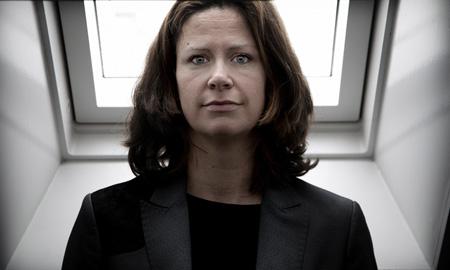Signe Leick Jensen happened to be answering the phones at a public access TV station the day someone from the National Film School called up and asked for people to help shoot that year's graduation films. The year was 1994. Leick Jensen was 19 and wasn't even sure that she wanted to get into movies. Today she couldn't imagine not being in the circus of filmmaking, a life she loves.
Leick Jensen recently wrapped up her work on Bille August's "Marie Krøyer", which she and Karin Trolle produced for SF Film Production. It's hardly her first time working with a legendary Danish director. She cut her teeth on Nils Malmros' "Barbara" (1997) and later joined the Nimbus film company together with Morten Kaufmann, now her partner in Toolbox Film.
This was right at the time that the Dogme wave was swelling and washing over the world. It almost knocked Leick Jensen off her feet, too.
Four features in one year
"One year, we did four features back to back," Leick Jensen says. "It was hard work. I was still in my early twenties and hadn't even had time to finish my college preps. So I decided to take some time off from the industry and try to figure out what I wanted to do. I had this idea that I wanted to study political science or maybe go into journalism."
Nine months later, having sailed around the world, she knew that movies were what really floated her boat. Soon, she became production manager on Thomas Vinterberg's "It's All about Love".
"That film was my baptism by fire. We were juggling a huge budget and international stars, all the while travelling to six different countries," Leick Jensen says. "Plus, there was a lot of follow-up work on the film, wrapping up contracts and the final financing together with the film's producer Birgitte Hald. That was my film school. It really dawned on me then that I not only have organisational skills but also a good head for numbers."
It has been full steam ahead for Leick Jensen ever since. She was the line producer on Lars von Trier's "Manderlay". Together with Vibeke Windeløv and Meta Louise Foldager, she produced von Trier's comedy "The Boss of It All". She worked on Louise Friedberg's drama "The Experiment" and, more recently, Ole Christian Madsen's comedy "Superclásico", which was short-listed for an Academy Award earlier in the year.
"I enjoy working across genres and seeing a film through in close collaboration with the director. As a producer, I consider it my duty and my responsibility to make sure there is constant sparring and development around each individual film in all its processes. It's not just a question of financing but also of taking responsibility for the processes."
Working as a producer lets her live out her desire to explore the world, she says.
"You have an obligation to be curious. To get out there and meet people and be curious about them and their stories."
With that in mind, Leick Jensen has hooked up with EAVE (European Audiovisual Entrepreneurs), an organisation that provides project development, networking and training for producers from all over the world.
"It's amazing for me to get the tools and international skills they provide." She's hoping to reap similar rewards from serving as the Danish Producer on the Move in Cannes.
Scandinavian privilege
"It's terrific and also important to look over the hedge once in a while and get fresh inspiration from outside," Leick Jensen says. "Moreover, this has confirmed to me how privileged we are in Scandinavia, because we have public funding systems that provide screenplay and development support. You don't get that anywhere else in the world, practically. We have to keep optimising our system, of course, but it's really good to get a chance to meet people who know how to produce films on a shoestring."
There are other reasons why Danish cinema is sitting pretty, she says. "Danish cinema is a good brand. Names like Lars von Trier and Zentropa have done a good job for Danish cinema, which clearly benefits us all."
Even with the effects of the recession still reverberating around the world, Leick Jensen and her business partner Morten Kaufmann had no qualms about opening their own company, Toolbox Film, about one year ago.
"It's a risky time to start up a company, of course," she says. "It's challenging but fun, too. Being a small company with low overhead gives us a degree of freedom. Even with the recession, there are so many exciting things going on right now, like new forms of distribution, that require us to think production and marketing into our processes in a whole new way – and, frankly, I think that's a lot of fun. A company that's so new has no ‘usual' way of doing things.
"Our vision is to develop and produce films for theatrical and TV release. At the moment, we have a comedy, a political thriller, a tragicomic chamber drama and two children's films in development. We believe our strength lies in our professional curiosity," Leick Jensen says.
Meanwhile, she is maintaining her ethos of appreciating the individual director. "They're the ones putting their name on the line and you've got to respect that. It takes a lot of guts to make a film."
Read also
Shining light on Marie in FILM#75
